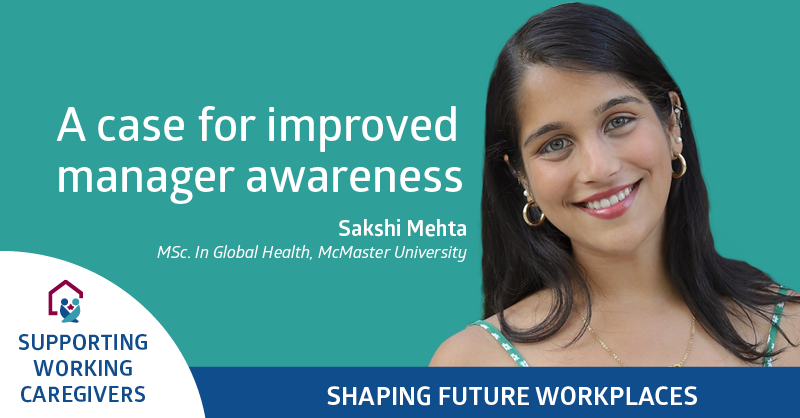Are healthcare employers in tune with their employee caregivers?
It is in employers’ best interests to support their working caregivers to help prevent outcomes such as poor work performance, absenteeism and employee turnover. Do they?
In the healthcare sector, many workers are ‘double duty carers’ (DDCs) – individuals who provide care both at work and at home. In their paid work, DDCs often work as front-line essential health care service providers in home care, or facility-based care. Research has shown that health care organizations and DDCs often wait too long to act with preventative measures to support DDCs. Additionally, community care organizations, which support care recipients, often fail to dialog with DDCs about their wishes concerning the division of caregiving tasks.[i]
The COVID-19 pandemic not only changed the healthcare work environment but also placed additional stressors on these vulnerable carers. It was therefore interesting to study the understanding employers had of DDC wellbeing during the pandemic, as well as the workplace supports that were implemented in response to the onset of COVID-19.
The research was undertaken between January and July 2021 while COVID restrictions were in place and hospital patient capacity was exceeded in many parts of the country. This timeframe impacted recruitment to the study; although many expressed interest, they felt too pressed to participate. However, there was the advantage of almost “real time” recall. By the end of the enrollment phase there were 29 healthcare employer participants from across southern Ontario.
Using perspectives of both employers (represented by managers or human resource staff) and DDCs, the study investigated how DDCs’ caring experiences, supports, and use of coping strategies had changed with the pandemic. Triangulation of both perspectives was then used to create evidence-based recommendations to enhance DDC supports.
Employers expressed the pressure of implementing new safety precautions and ensuring that employees were safe and following new guidelines that initially changed frequently. Employers found it more difficult to spend time to provide support to DDCs because of the added workload associated with pandemic management.
Fewer than half of the employers added support for their DDCs, despite recognizing their poorer wellness. The reason for this was a lack of awareness of the requisite supports needed (76% of employers). Notwithstanding this finding, employers surveyed did not believe that DDCs would face stigmatization and be reluctant to share their situation and needs. Overall, employers were less likely to implement long-term changes to support DDCs if it was not mandated by the workplace or provincial regulations.
This research holds implications for larger quantitative studies investigating employers’ perspectives regarding DDC support. It also raises the question of barriers employers might have had in implementing supportive measures for their carer employees. Thus, implications of this research point towards key areas of improvement: ameliorating the knowledge and needs of DDCs by healthcare employers, facilitating an inclusive and open work environment, and improving awareness and access to existing services that may benefit DDCs in their unpaid caring role.
Read the final Briefing Paper
References
[1] Detaille Sarah I., de Lange Annet, Engels Josephine, Pijnappels Mirthe, Hutting Nathan, Osagie Eghe, Reig-Botella Adela. Supporting Double Duty Caregiving and Good Employment Practices in Health Care Within an Aging Society. Frontiers in Psychology, vol 11, pg 2901. Retrieved on Jan 3, 2022 from https://www.frontiersin.org/article/10.3389/fpsyg.2020.535353
ABOUT THE PROJECT
Carers Canada is leading the knowledge mobilization activities for a multi-sectorial research program to spread and scale a carer-friendly workplace standard, known as the ‘Carer-Inclusive and Accommodating Organizations’ Standard (CSAB701-17). Led by Dr. Allison Williams, CIHR Research Chair in Gender, Work and Health at McMaster University, the research program consists of six inter-related sub-projects that will: increase awareness of the standard across Canada; evaluate readiness to change; determine feasibility and cost benefit; embrace cultural competency; consider Indigenous perspectives; and create an international standard. Learn more

CIHR/SSHRC Healthy Productive Work Partnership Grant “Scaling up the Career Inclusive Accommodating Organizations Standard” FRN: HWP-146001 (CIHR); 890-2016-3018 (SSHRC).
 Sakshi MehtaJanuary 24, 2022
Sakshi MehtaJanuary 24, 2022

Are healthcare employers in tune with their employee caregivers?
It is in employers’ best interests to support their working caregivers to help prevent outcomes such as poor work performance, absenteeism and employee turnover. Do they?
In the healthcare sector, many workers are ‘double duty carers’ (DDCs) – individuals who provide care both at work and at home. In their paid work, DDCs often work as front-line essential health care service providers in home care, or facility-based care. Research has shown that health care organizations and DDCs often wait too long to act with preventative measures to support DDCs. Additionally, community care organizations, which support care recipients, often fail to dialog with DDCs about their wishes concerning the division of caregiving tasks.[i]
The COVID-19 pandemic not only changed the healthcare work environment but also placed additional stressors on these vulnerable carers. It was therefore interesting to study the understanding employers had of DDC wellbeing during the pandemic, as well as the workplace supports that were implemented in response to the onset of COVID-19.
The research was undertaken between January and July 2021 while COVID restrictions were in place and hospital patient capacity was exceeded in many parts of the country. This timeframe impacted recruitment to the study; although many expressed interest, they felt too pressed to participate. However, there was the advantage of almost “real time” recall. By the end of the enrollment phase there were 29 healthcare employer participants from across southern Ontario.
Using perspectives of both employers (represented by managers or human resource staff) and DDCs, the study investigated how DDCs’ caring experiences, supports, and use of coping strategies had changed with the pandemic. Triangulation of both perspectives was then used to create evidence-based recommendations to enhance DDC supports.
Employers expressed the pressure of implementing new safety precautions and ensuring that employees were safe and following new guidelines that initially changed frequently. Employers found it more difficult to spend time to provide support to DDCs because of the added workload associated with pandemic management.
Fewer than half of the employers added support for their DDCs, despite recognizing their poorer wellness. The reason for this was a lack of awareness of the requisite supports needed (76% of employers). Notwithstanding this finding, employers surveyed did not believe that DDCs would face stigmatization and be reluctant to share their situation and needs. Overall, employers were less likely to implement long-term changes to support DDCs if it was not mandated by the workplace or provincial regulations.
This research holds implications for larger quantitative studies investigating employers’ perspectives regarding DDC support. It also raises the question of barriers employers might have had in implementing supportive measures for their carer employees. Thus, implications of this research point towards key areas of improvement: ameliorating the knowledge and needs of DDCs by healthcare employers, facilitating an inclusive and open work environment, and improving awareness and access to existing services that may benefit DDCs in their unpaid caring role.
Read the final Briefing Paper
References
[1] Detaille Sarah I., de Lange Annet, Engels Josephine, Pijnappels Mirthe, Hutting Nathan, Osagie Eghe, Reig-Botella Adela. Supporting Double Duty Caregiving and Good Employment Practices in Health Care Within an Aging Society. Frontiers in Psychology, vol 11, pg 2901. Retrieved on Jan 3, 2022 from https://www.frontiersin.org/article/10.3389/fpsyg.2020.535353
Sakshi Mehta recently completed her education at McMaster University, graduating with an Honours Bachelor of Health Sciences and Master of Science in Global Health. She is currently continuing her studies to pursue Public Service and work towards a career in health policy or public health. For the past two years, she has worked for the Council of Agencies Serving South Asians, a non-profit aimed at promoting equity and empowerment for marginalized communities. Through various research, community, and work experiences, Sakshi has developed a passion for working at the intersections of equity, education, and health policy.
FAVORITE PASTIME: In her spare time, Sakshi can be found cooking, discovering new coffee shops, working out or catching up on her favourite shows.
Instagram: @sakshiisk
Facebook: @sakshi0403
LinkedIn: @Sakshi Mehta
Twitter: @sakshiisk
ABOUT THE PROJECT
Carers Canada is leading the knowledge mobilization activities for a multi-sectorial research program to spread and scale a carer-friendly workplace standard, known as the ‘Carer-Inclusive and Accommodating Organizations’ Standard (CSAB701-17). Led by Dr. Allison Williams, CIHR Research Chair in Gender, Work and Health at McMaster University, the research program consists of six inter-related sub-projects that will: increase awareness of the standard across Canada; evaluate readiness to change; determine feasibility and cost benefit; embrace cultural competency; consider Indigenous perspectives; and create an international standard. Learn more

CIHR/SSHRC Healthy Productive Work Partnership Grant “Scaling up the Career Inclusive Accommodating Organizations Standard” FRN: HWP-146001 (CIHR); 890-2016-3018 (SSHRC).